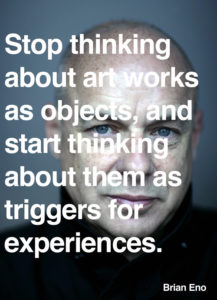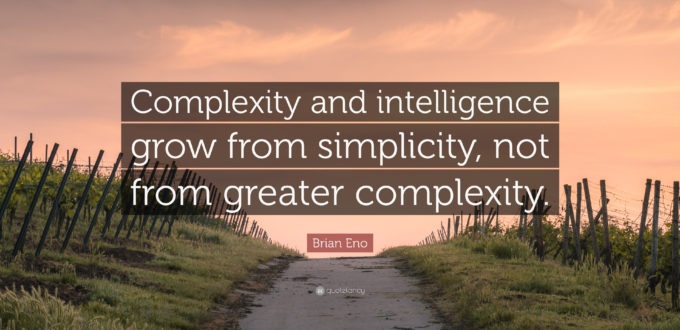#Learn How To See
Listen
“.. the central idea was about music as a place you go to. Not a narrative, not a sequence that has some sort of teleological direction to it—verse, chorus, this, that, and the other. It’s really based on abstract expressionism: Instead of the picture being a structured perspective, where your eye is expected to go in certain directions, it’s a field, and you wander sonically over the field. And it’s a field that is deliberately devoid of personalities because if there’s a personality there, that’s who you’ll follow. So there’s not somebody in that field leading you around; you find your own way.”
Less is More
“As a maker, you tend to do too much, because you’re there with all the tools and you keep putting things in. As a listener, you’re happy with quite a lot less……It’s a discipline, because the path of least resistance for anyone with a lot of sound-making tools is to keep making more sounds. The path of discipline is to say: Let’s see how few we can get away with.”

” I really think that for us, who all grew up listening primarily to recorded music, we tend to forget that until about 120 years ago ephemeral experience was the only one people had. I remember reading about a huge fan of Beethoven who lived to the age of 86 [in the era before recordings], and the great triumph of his life was that he’d managed to hear the Fifth Symphony six times. That’s pretty amazing. They would have been spread over many years, so there would have been no way of reliably comparing those performances.
All of our musical experience is based on the the possibility of repetition, and of portability, so you can move music around to where you want to be, and scrutiny, because repetition allows scrutiny. You can go into something and hear it again and again. That’s really produced quite a different attitude to what is allowable in music. I always say that modern jazz wouldn’t have existed without recording, because to make improvisations sound sensible, you need to hear them again and again, so that all those little details that sound a bit random at first start to fit. You anticipate them and they seem right after a while. So in a way, the apps and the generative music are borrowing from all of the technology that has evolved in connection with recorded music and making a new kind of live, ephemeral, unfixable music. It’s a quite interesting historical moment.”
*
You can’t really make apolitical art. We started out talking about ways of composing; ways of composing are political statements. [Pulls out his pencil and points to a diagram on his laptop.] If your concept of how something comes into being goes from God, to composer, conductor, leader of the orchestra, section principals, section sub-principals, rank and file, that’s a picture of society, isn’t it? It’s a belief that things work according to that hierarchy. That’s still how traditional armies work; the church still works like that. Nothing else does, really. We’ve largely abandoned that as an idea of how human affairs work. We have more sophisticated ways of looking at things.
But to make something is to express a belief in how things belong together. To me, that’s a political statement. So I’m suggesting a funny mixture of bottom-up and top-down, which is actually what I think nature does. It’s a mixture of will and desire with an understanding of ecology—how complex things mesh together, and how much you can interfere with that. Where do you allow freedoms and where do you try to constrain results? That’s what I’m learning and practicing in doing this. It is a political statement.”
- Credit Pitchfork Article: A Conversation With Brian Eno About Ambient Music
The unceasingly curious composer on chance, minimalism, and the politics of form.
“REFLECTION is the most recent of my Ambient experiments and represents the most sophisticated of them so far. My original intention with Ambient music was to make endless music, music that would be there as long as you wanted it to be. I wanted also that this music would unfold differently all the time – ‘like sitting by a river’: it’s always the same river, but it’s always changing. But recordings – whether vinyl, cassette or CD – are limited in length, and replay identically each time you listen to them. So in the past, I was limited to making the systems which make the music, but then recording 30 minutes or an hour and releasing that. REFLECTION in its album form – on vinyl or CD – is like this. But the App by which REFLECTION is produced is not restricted: it creates an endless and endlessly changing version of the piece of music.”
